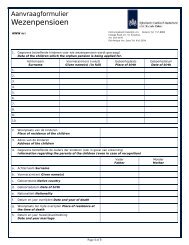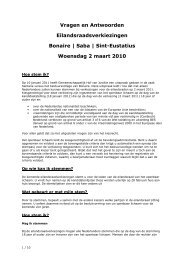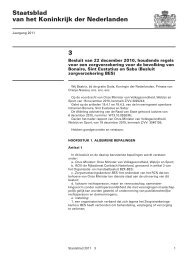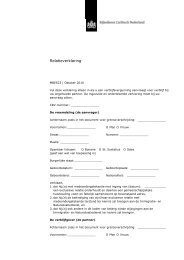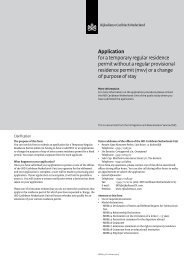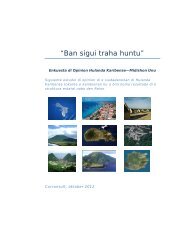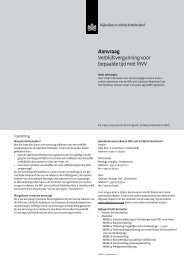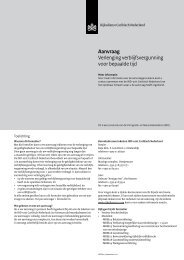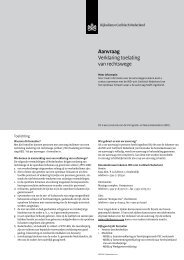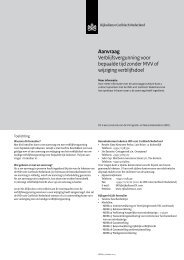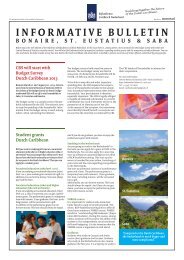here - Rijksdienst Caribisch Nederland
here - Rijksdienst Caribisch Nederland
here - Rijksdienst Caribisch Nederland
- No tags were found...
Create successful ePaper yourself
Turn your PDF publications into a flip-book with our unique Google optimized e-Paper software.
ZorgverzekeringskantoorInformation brochure healthcare insurancefor the insured of the Healthcare insurance Bonaire, Saba and St. Eustatius.As per January 1, 2011In this brochure you will find comprehensive information about the healthcare insurance coverage rights the insured onBonaire, Saba and St. Eustatius are entitled to. Go through this brochure thoroughly and save it.In case of doubt and/or disputes concerning your health care insurance rights, the text of the Order in Council HealthcareInsurance BES (Algemene maatregel van bestuur zorgverzekering BES) and the Ministerial Regulation Healthcare InsuranceRights BES (Ministeriële regeling zorgaanspraken BES) determine healthcare entitlements.
Chapter 1 General .................................................................................................................................... 31.1 Introduction ............................................................................................................................ 31.2 Principles ................................................................................................................................ 31.3 Intention ................................................................................................................................ 3Chapter 2 The healthcare insurance office (ZVK) ........................................................................................ 42.1 What is the ‘ZVK’? .................................................................................................................... 42.2 What does the ‘ZVK’ do? ........................................................................................................... 42.3 How do I contact the ‘ZVK’?............................................................................................................. 42.3.1 Locations ................................................................................................................................. 42.3.2 Opening hours (temporary) ...................................................................................................... 5Chapter 3 The insured and the insured administration ............................................................................... 63.1 Who are insured? ..................................................................................................................... 63.2 Who are not insured? ............................................................................................................... 63.3 How does this work in practice? ................................................................................................ 63.3.1 The insured administration ....................................................................................................... 63.3.2 Proof of insurance: special group of insured individuals ............................................................. 73.3.3 Sometimes permission prior to treatment required .................................................................... 7Chapter 4 Health care claims package ....................................................................................................... 84.1 General Practitioner Care ......................................................................................................... 84.2 Primary Psychological care ....................................................................................................... 84.3 Specialist –Medical Care ........................................................................................................... 84.4 Hospital Care .......................................................................................................................... 114.5 Paramedical Care .................................................................................................................... 114.5.1 treatments physical therapy and exercise therapy ....................................................................... 114.6 Dental Care ............................................................................................................................ 134.7 Pharmaceutical care ................................................................................................................ 144.8 Auxiliaries (Medical Aids)......................................................................................................... 154.9 Obstetric Care ......................................................................................................................... 164.10 Maternity Care ........................................................................................................................ 164.11 Patient Transport .................................................................................................................... 174.12 Repatriation Costs of the Deceased........................................................................................... 174.13 Long-term care ....................................................................................................................... 174.14 Medical treatment abroad ....................................................................................................... 17
Chapter 5 Legal protection ..................................................................................................................... 205.1 Rights and Obligations ........................................................................................................... 205.1.1 Right of the insured ................................................................................................................ 205.1.2 Obligations of the insured....................................................................................................... 205.2 Complaint procedure ............................................................................................................. 205.3 National Ombudsman ............................................................................................................. 215.4 Objection ............................................................................................................................... 215.5 Appeal in court and Disciplinary Proceedings ............................................................................ 21
Chapter 1 General1.1 IntroductionAs of January 1, 2011 a new mandatory healthcare insurance is provided for all residents of the islands ofBonaire, Saba and St. Eustatius (<strong>here</strong>inafter: the Dutch Caribbean); the Dutch Caribbean HealthcareInsurance (<strong>here</strong>inafter: Healthcare Insurance). An uniform insurance for all residents serves the equality ofrights and prevents that some people remain uninsured.As per January 1, 2011, the RCN- unit Healthcare Insurance Office (<strong>here</strong>inafter: ‘ZVK’) implements the publichealthcare insurance as regulated in the Healthcare Insurance Decree (Besluit zorgverzekering BES). Thehealthcare insurance includes both the medical care ('cure') as well as the long-term care ('care' formerlyAVBZ).1.2 PrinciplesThe Healthcare Insurance is based on the Healthcare Decree (Besluit zorgaanspraken BES <strong>here</strong>inafter: theDecree) and the Regulation Healthcare coverage claims (Regeling zorgaanspraken BES <strong>here</strong>inafter: theRegulation). 11.3 IntentionThe healthcare insurances on the Netherlands Antilles arecurrently accommodated in various regulations targetingspecific groups of individuals. These regulations are amongothers the "Ziektewet" – Sickness Benefits Act and the"Ongevallenwet" – Accidents and Injuries Act, national andisland healthcare cost regulations including the AVBZ andvarious private insurances.As of January 1, 2011 the Healthcare Insurance replaces allexisting regulations and private insurances to the extent thatthese cover the same as the Healthcare Insurance.The insurance provides for both the section curative care and the section long-term care in an incomedependent premium that all insured with an income above the tax free allowance ($ 9,750 - $ 12,250) aresubjected to. Employers must also pay premiums for their employees. These premiums are levied andcollected by the Tax Authority.1 In the course of December 2010, the Order in Council Healthcare Insurance (Besluit Zorgverzekering BES) and Ministerial Regulation HealthcareInsurance (Ministeriële regeling zorgaanspraken BES) is available on our website: www.<strong>Rijksdienst</strong>CN.com3
Chapter 2 The healthcare insurance office (ZVK)2.1 What is the ‘ZVK’?Het ZVK is het onderdeel van de RCN dat ten behoeve van de Minister vanVolksgezondheid, Welzijn en Sport (hierna: Onze Minister) ten dienstestaat aan de uitvoering van het Besluit.Het motto van het ZVK is: ‘Zorg voor mensen in een gezondesamenleving’Het ZVK streeft naar een optimale dienstverlening. De klanten mogenverwachten dat het ZVK:• goed bereikbaar is via internet, telefoon, balie en post;• begrijpelijk communiceert in zijn contacten en beslissingen;• snel zaken afhandelt2.2 What does the ‘ZVK’ do?The main task of the ‘ZVK’ is the implementation of the Healthcare Insurance Decree (Besluit ZorgverzekeringBES). Its tasks can be described as follows.The ‘ZVK’:• contracts healthcare providers to provide care to the insured;• publishes a list of healthcare providers that the insured can go to for treatment;• makes payments to the healthcare providers and possibly to the insured;• provides information to the insured, healthcare providers and employers;• authorizes healthcare providers prior to certain types of treatments;• investigates the quality of care.The tasks of the ‘ZVK’ are <strong>here</strong>with not exhaustive.2.3 How do I contact the ‘ZVK’?2.3.1 LocationsThe ‘ZVK’ has locations on Bonaire, St. Eustatius and Saba.BonaireHealthcare Insurance Office BonaireCentrumgebied Kralendijk z/nKralendijk(former SVB office)Temporary general telephone number: +599 717 83 33Fax number: +599 717 83 30E-mail: infoZVK@<strong>Rijksdienst</strong>CN.com or infoBonaireZVK@rijksdienstCN.comwww.<strong>Rijksdienst</strong>CN.com4
Sint-EustatiusHealthcare Insurance Office St. EustatiusMazinga Complex A, BFort OranjestraatOranjestad(RCN office)General telephone number: +599 318 33 70E-mail: infoZVK@<strong>Rijksdienst</strong>CN.com or infoBonaireZVK@rijksdienstCN.comwww.<strong>Rijksdienst</strong>CN.comSabaHealthcare Insurance Office SabaThe BottomSaba(RCN office)General telephone number: +599 416 39 34E-mail: infoZVK@<strong>Rijksdienst</strong>CN.com or infoBonaireZVK@rijksdienstCN.comwww.<strong>Rijksdienst</strong>CN.com2.3.2 Opening hours (temporary)The offices are open for the public on working days from Mondays through Fridays:Bonaire: 08.00-12.00 13.00-17.00St. Eustatius 09.00-13.00Saba 08.00-12.00 13.30-16.00The offices can be reached by telephone on working days from Mondays through Fridays:Bonaire 08.00-12.00 13.00-17.00St. Eustatius 09.00-13.00 14.00-15.30Saba 08.00-12.00 13.30-16.005
Chapter 3 The insured and the insuredadministrationThe healthcare insurance is applicable to everybody without distinction: young and old, employee or selfemployed or benefit recipient. Nobody can evade it. To this end, it is not important whether someone has ordoesn't have the Dutch nationality.3.1 Who are insured?Insured by virtue of law are those lawfully residing on Dutch Caribbeanterritory as well as those lawfully working on Dutch Caribbean territory.The group of insured individuals is extended with individuals who have apermanent residence permit based on the Admittance and Deportation ActBES (Wet toelating en uitzetting BES). Also students, younger than 30 years,who leave the Dutch Caribbean territory with the only purpose to studyelsew<strong>here</strong>, are insured. Beside that are insured the employees of employersresiding or established on Dutch Caribbean territory that are deployedoutside Dutch Caribbean territory.3.2 Who are not insured?Not insured are individuals younger than 30 years who reside on Dutch Caribbean territory only to study. Thesame applies to trainees and lab trainees who reside on Dutch Caribbean territory. These people t<strong>here</strong>foremust have a private healthcare insurance or a social insurance from the country of origin that has coverageon Dutch Caribbean territory.Individuals residing on Dutch Caribbean territory but who are employed by a Dutch public entity or of anemployer residing or established in the Netherlands, are also not insured. The same applies to individualswho work outside the Dutch Caribbean for at least three consecutive months unless they are employed by anemployer in the Dutch Caribbean.3.3 How does this work in practice?3.3.1 The insured administrationAnyone registered in the Public registry regarding population of Bonaire, Saba or St. Eustatius can apply foran ID "sedula". Upon showing this ID to the contracted healthcare providers the insured can claim his rightsto care.For this, the ‘ZVK’ has an insured administration. The healthcare providers have access to this insuredadministration and can check if someone is indeed insured.The healthcare provider does not charge the insured for the treatments or as the case maybe operations butsends the invoice to the ‘ZVK’ for payment. The ‘ZVK’ pays the costs to the healthcare provider.6
Chapter 4 Health care claims packageThe insured are entitled to medical care as regulated in the Decree and in the Regulation. For the details onthe claims package you are referred to the relevant articles from the Regulation. The claims package is not astatic but can be adjusted by the Minister whenever t<strong>here</strong> may be reason to do so based on developmentswithin the healthcare system.Prior to certain claims or types of treatment the ‘ZVK’ must give permission. 2 The cases in which the ‘ZVK’must give this consent are further indicated in this chapter per type of claim.The claims package encompasses in any case:4.1 General Practitioner CareThe insured is entitled to medical and surgical care to be provided by a general practitioner.General Practitioner Care entails:• the consultation;• the visit;• the medical prescription.Moreover, the insured is entitled to additional laboratory,radiological, function and pathological-anatomical testsupon referral of the general practitioner.Medical examinations and alternative cure methods are notincluded in the general practitioner care and are t<strong>here</strong>forenot included in the claims package.4.2 Primary Psychological careThe insured is entitled to treatment by an independently established psychologist prescribed by a generalpractitioner, specialist or nursing general practitioner. This includes a maximum of 9 treatments includingthe intake session.4.3 Specialist –Medical CareSpecialist medical care concerns medical care, specialist mental care by a medical specialist, a psychiatrist, ahospital, an audiological center, a dialysis centre or a thrombosis center. . The insured is entitled to this careonly upon referral from a general practitioner or a specialist. An obstetrician may also refer to obstetric careby a gynecologist.Furthermore the specialist medical care encompasses the following treatments within the scope and subjectto the further conditions of the Regulation.2 See paragraph 3.3.3. for the procedure of permission.8
Various forms of transplantation transplant of tissues and organs:• bone marrow transplant;• bone e transplantationgraft;• cornea transplant;• skin tissue transplant;• kidney transplant;• heart transplant;• liver transplant, coupled with the removal of the recipient’s own liver;• lung transplant;• heart – lung transplant;• kidney pancreas transplant;This, as long as it concerns the indication area that is generally accepted for the relevant form of transplant.Treatment of plastic-surgery nature for the correction of :• abnormalities in the appearance that are coupled with demonstrable physical function disorders;• disfigurations that are the consequence of a disease, accident or medical operation;• paralyzed or drooping eyelids that are the consequence of a congenital defect or a chronic disorder presentat birth;• the following congenital malformations: lip, jaw and split palates, deformities of the facial bone structure,benign proliferations of blood vessels, lymphatic vessels or connective tissues, birth marks andmalformations of the urinary tract and genitals;• external sexual characteristics of a set transexualism.Treatment of plastic-surgical nature does not include:• treatment of paralyzed or drooping eyelids that are not the consequence of a congenital anomaly or achronic disease present at birth;• abdominoplasty and liposuction of the abdomen;• the surgical placement of a breast prosthesis other than after state in case of a full or partial mastectomy;• the surgical removal and placement of a breast prosthesis after the treatment referred to under sub c;• treatments against snoring with uvular correction;• treatments aimed at circumcision.Permission of the ‘ZVK’.The costs of all treatments of plastic-surgery are only covered by the ‘ZVK’ after prior permission.Second opinion from a qualified healthcare provider in the region in case of :• a life threatening condition;• a doubt in connection with urgency of a treatment;• a surgery with irreversible consequences;• a well founded doubt about the payment method;Medically required UVB light therapy.Assistance Audiological centerThe insured is entitled to audiological assistance for up to a maximum of 6 weeks.9
This assistance includes:• examination of the hearing function;• advice on the hearing aids to be purchased;• information on the use of the aids;• psychosocial assistance if necessary in connection with problems with hearing dysfunction.permission of the ‘ZVK’.The ‘ZVK’ must give permission if the audio logical assistance must be provided for more than 6 weeksAssistance Genetic CounselingAssistance within the scope of genetic counseling includes research in and of genetic anomalies throughgenealogical research, chromosome research, biochemical diagnostics, ultra sound research and DNAtesting,providing genetic advice and related psychosocial assistance.Outpatient hemodialysisThe outpatient hernodialysis includes:• the required hemodialysis for the insured, the related medical examination, treatment andpharmaceutical assistance of which; the required erythropoietin for the insured;• coverage of the costs related to the psychosocial assistance of the insured and/ or of persons who areinvolved in the performing of the dialysis elsew<strong>here</strong> than at the dialysis center, some to be provided byexperts associated with the dialysis center.T<strong>here</strong> must be a medical indication for outpatient dialysis.Chronic Intermittent InsufflationThe chronic intermittent insufflation includes:• the regular stay for less than 24 hours in a respiration center for mechanical insufflation;• the use of mechanical insufflation equipment at the home of the insured, or in a specially equippedpremises, if the insufflation takes place t<strong>here</strong> and under the responsibility of a respiration center asreferred to under sub a.Permission of the ‘ZVK’.The ‘ZVK’ must give permission prior to the assistance from chronic intermittent insufflation. Theapplication for permission must be accompanied by a motivation of the attending physician.Assistance by a Thrombosis serviceThe assistance by a Thrombosis service includes the care upon prescription of the attending physician:regularly taking blood samples from the insured;• the performance of or else having the necessary laboratory tests performed under the responsibility of theservice to determine the blood clotting time;• making equipment and supplies available to the insured with which he can measure the clotting time ofhis blood;• training the insured, referred to in sub c, in the use of the equipment mentioned in that sub, as well as theassistance of the insured with his measurements;• giving advice to the insured regarding the application of the drugs to influence coagulation.10
4.4 Hospital CareThe insured is entitled to hospitalization. In connection with obstetric care both the mother and the child areentitled to hospitalization.The insured will be hospitalized in all cases in the third class, in a space with an adequate climate controlsystem and insect repellant system. Hospitalization to a higher class is only covered if this is medicallyrequired. The attending healthcare provider determines in which cases placement in a higher class ismedically required.4.5 Paramedical CareThe insured is entitled to the following paramedical care within the scope and subject to the conditions ofthe Regulation.• physiotherapy and exercise therapy by Ceaser and Mensendieck physical therapists and exercise therapistswith the objective of cure, improvement, reducing pain than conservation of an as fit as possible physicalcondition up to a maximum of 9 treatments per indication per calendar year;;• speech therapy; with the purpose of recovery or improvement of the speech function or the speech ability ;• occupational therapy with the objective of stimulating the self care and self reliance of the insured up to amaximum of 10 hours per calendar year;• dieticians’ treatment regarding education with a medical objective on nutrition and eating habit up to amaximum of 4 hours per calendar year;• podological treatment, podology soles and podiatry;• medical pedicures for people with diabetic feet;The physio therapy includes the the pelvic physiotherapy in connection with urinary incontinence.The physiotherapy and the exercise therapy can be extended with a maximum of 9 treatments based onrevised treatment plan.The insured is not entitled to chiropractic treatment or electric hair removal.Speech therapyThe ‘ZVK’ must give permission prior to a speech therapy treatment. The application for permission must beaccompanied by a proper motivation of the referring physician or dental specialist.Medical PedicureThe insured is entitled to medical pedicure in connectionwith diabetic feet only after permission of the ‘ZVK’.4.5.1 treatments physical therapy and exercisetherapyIf the insured suffers from one of the following chronicdisorders that are coupled to disorders that lead to severelimitations in basic mobility skills, the personal care or themobility, he may claim physiotherapy or exercise therapytreatments than mentioned in paragraph 4.5.11
1. one of the following disorders of the nervous system:1º. cerebrovascular accident;2º. spinal cord disease;3º. multiple sclerosis;4º. peripheral nerve disease in case of motor loss;5º. extra pyramidal disorder;6º. motor retardation or a developmental disorder of the nervous system and he is younger than 17 years;7º. congenital anomaly of the central nervous system;8º. cerebellar disorder;9º. loss of function caused by a tumor in the brain or spinal cord or as a result of brain damage;10º. radicular syndrome with motor loss; for a maximum period of three months;11º. muscle disease;12º. myasthenia gravis, or2. or one of the following disorders of the musculoskeletal:1º. congenital anomaly;2º. progressive scoliosis;3º. juvenile osteochondrosis and he is younger than 22 years;4º. reflex dystrophy;5º. vertebral fracture due to osteoporosis;6º. fracture due to morbus Kahler, bone metastasis or morbus Paget;7º. frozen shoulder (capsulitis adhaesiva); for maximum period of 12 months8º. rheumatoid arthritis or chronic rheumatism;9º. chronic arthritis;10º. ankylosing spondylitis (morbus Bechterew);11º. reactive arthritis;12º. juvenile chronic arthritis;13º. hyperostotic spondylosis (morbus Forestier);14º. collagen diseases;15º. status after amputation;16º. whiplash; for a maximum period of 3 months. If after this t<strong>here</strong> is still a situation of the triad motionloss, loss of stamina (condition loss) and cognitive impairment this period may be extended by up-to 6months;17º. post-partum pelvic instability; for a maximum period of 3 months;18º. fractures, if these are treated conservatively, for a maximum period of 6 months after conservativetreatment;3. or one of the following heart conditions:1º. myocardial infarction (AMI);2º. status after coronary artery bypass- surgery (CABG);3º. status after percutaneous transluminal coronary angioplasty (PTCA);4º. status after cardiac surgery;5º. status after surgically corrected congenital defects, or12
4. or one of the following conditions:1º. chronic obstructive pulmonary disease if t<strong>here</strong> is a FEV1/VC less than 60%;2º. congenital anomaly of the respiratory tract;3º. lymph edema4º. scar tissue of the skin after a trauma or otherwise;5º. status after admission to a hospital, a nursing facility or an institution for rehabilitation or else after aday treatment at an institution for rehabilitation and the assistance intends to accelerate the recovery afterdischarge to home or the termination of day treatment; for a maximum period of 12 months followingdischarge or termination of the treatment;6º. intermittent claudication (vascular) grade 2 or 3 Fontaine; for a maximum period of 12 months;7º. soft tissiue tumoren;8º. diffuse interstitial lung disease in case of respiratory limitation and diffusion impairment.4.6 Dental CareThe insured individual younger than 18 years (juvenile) is entitled to dental care by an institute for juveniledental care; by a dentist or by dental specialist.The dental care for the insured juvenile encompasses the following treatments within the scope and subjectto the conditions of the Regulation.• periodic preventive dental examination once a year unless more care is required from a dental careperspective;• incidental consultation;• the removal of tartar;• fluoride application from the age of 6 up to a maximum of twice a year,. In special cases t<strong>here</strong> can be aclaim to fluoride application more than twice a year;• sealing;• periodontal support (assistance with inflammation surrounding tooth);• anesthesia;• endodontic treatment (assistance with root canal inflammation);• restoration of teeth elements with plastic materials;• gnathological assistance (assistance with mandibular jointand muscles);• removable prosthetic devices;• tooth replacement assistance with non-plastic materials ifthis concerns the replacement of one or more missing,permanent incisive or eye teeth that are not in place orelse because the absence of that tooth or those teeth is thedirect result of an accident;• dental surgery assistance, except for the fitting of a dentalimplant;• X-ray exam, except for X-ray exam for orthodontic assistance.Orthodontics except for esthetic orthodontics is partially covered for insured individuals younger than 18years. The coverage amounts to US$ 2,500 for the entire term of the insurance (contract) for fixed equipmentand US$ 500 for removable devices.13
The insured of 18 years and older (adult) is entitled to:• Removable full prosthetic devices for the upper and lower jaw• Dental surgery and the related x-ray exam, with the exception of periondontal surgery, straightforwardextractions and the placement of a dental implant• The placement of a dental implant and the related surgical assistance if it concerns a severely atrophiedtoothless jaw and the application serves the placement of a removable prosthesis.The adult is entitled to a one-time remediation. The remediation consists of an x-ray, anesthesia, restorationof the teeth elements with plastic materials and extractions.The insured has other than the abovementioned treatments, if those treatments are necessary in view of asevere congenital or acquired dental, physical or mental disorder, and that without that care he will not beable to maintain or acquire dental function.The dental care takes place in a practice space set up by the dentist and within the regular practice hours. Inspecial cases exceptions may be made. If the assistance is provided outside the regular practice hours theinsured must pay a contribution equivalent to the amount of additional costs.The dental care does not include treatment that is unnecessarily costly, unnecessarily complicated or that isdentally ineffective.permission of the ‘ZVK’.The insured younger than 18 years needs permission of the ‘ZVK’ prior to the following treatments.• periodontal surgery (surgery on inflammation surrounding tooth);• extraction under general anesthesia;• osteotomy;• placing of a dental implant.The ‘ZVK’ must give permission for other treatments related to severe congenital or acquired dental, physicalor mental disorders.4.7 Pharmaceutical careThe insured is entitled to:• advice and guidance from the pharmacists regarding medication and the responsible use of medicines;• polymer, oligomer, monomer and modular diet preparations if the insured cannot manage with adjustedstandard nutrition and other products of special nutrition.The pharmaceutical care also includes the flu vaccine.The insured is only entitled to pharmaceutical care that has been prescribed by a physician, dentist,obstetrician, or a person or institution that provides care of specific medical, specific behavioral scientific orspecific paramedical nature.In the pharmaceutical care, in principle, only generic medicines will be prescribed based on a list to bepublished.14
The insured up to 21 years of age also have the right to contraceptives. These contraceptives are thecontraceptive pill, the (hormone) IUD, the contraceptive implant, the diaphragm, and the morning-after pill.The insured is entitled to contraceptives if this medication serves to treat endometrioses, or the medication isintended to treat menorrhagia involving anemia.Per prescription only the amount of medication required for a maximum period of 1 month is provided.Exceptions are oral contraceptives: one year, medicines for chronic illnesses except for hypnotics andanxiolytics: 3 months, antibiotics or chemotherapeutic agents: fifteen days.The insured is entitled to repeat prescriptions. The pharmaceutical care does not include the coverage ofsimple painkillers.The insured has no right to drugs as a precaution or prevention of a disease in connection with a trip, regulardietary supplements and/or drugstore products.4.8 Auxiliaries (Medical Aids)The coverage of auxiliaries includes the provision of an adequately at all time functional device within thescope and subject to the conditions of the Regulation.The auxiliaries that the insured is entitled to, are the following.• prostheses for shoulder, arm, hand, leg or foot• breast prostheses if their use is appropriate to replace a part or almost entirely missing breast;• facial prostheses in order to cover the face or a portion t<strong>here</strong>of, including nose and ears;• eye prosthesis; full eye prosthesis when the eyeball is lacking; sclera scales; sclera lenses involving a severemalformed eye or after a traumatic change of one eye;• orthoses for torso, arm, leg, foot, head or neck such as orthopedic shoes;• vision auxiliaries like glasses and contact lenses up to a maximum of US$ 170 per two years for insured 18years and older and per year for insured younger that 18 years and their replacement;• hearing aids (individual contribution due);• care products such as urine collection bags, provisions for ostomy patients, catheters and incontinenceproducts;• devices for contraceptive purposes, such as diaphragms and IUDs;• aids to the mobility of persons such as crutches, walking aids, walkers, blind canes and – after permission -wheelchairs;• wigs up to a maximum of US$ 510 if the insured experiences such psychological problems from apermanent or long term, full or partial baldness, that the use of hair-ware is reasonably appropriate.;• syringes and accessories• external devices to be used in the prolonged compensating for loss of function of blood vessels in thetransportation of blood and the loss of function of lymphatic vessels for the transport of lymph;• tools such as blood sampling equipment for diabetes, blood glucose test meter, test strips and infusionpumps;• positive exhalation pressure devices;• portable external infusion pumps and accessories;• footwear provisions other than orthoses, such as bandage footwear and allergen-free shoes);• devices for administering food;• allergen free and dust-proof covers such as mattress, duvet and pillow shams;15
• tools for communication, information provision and signaling;• prosthetic devices for the lower or upper jaw unless covered under dental care;• oxygen devices or oxygen concentrators, with accessories;• lung vibrators;• nebulizers and accessories;• screen magnifiers;• external electro stimulators for chronic pain and accessories;• devices for continuous positive air pressure during breathing (CPAP equipment) with accessories;• solo equipment and accessories;• tactile reading equipment with accessories;• replacement of hearing aids that can be connected to an implanted bone conductor (BAHA hearing aid);• devices for the mobility of persons, such as tripping chairs and walking frames.• design elements for homes such custom adjusted furniture, anti-decubitus cushions, - beds and -mattresses.The coverage of auxiliariss also includes modifications or repair t<strong>here</strong>of except if this is a result of undeniablecareless use, training use, energy costs of certain equipment.The ‘ZVK’ decides if certain aid devices are provided as property or on loans.Permission of the ‘ZVK’.The ‘ZVK’ must give permission for the purchase of a wheelchair.4.9 Obstetric Care• The insured is entitled to the following obstetric care.• assistance in childbirth and maternity costs coverage• prenatal care• postnatal care• gynecologist on medical grounds• hospitalization for 3 days unless more days are medicallynecessary• use of delivery room• medical and nursing supplies• coverage of laboratory costsIn case of a home birth the costs of the obstetrician will becovered.4.10 Maternity CareThe insured mother and child are entitled to maternity care at home (24 -49 hours) or in a maternity home(up to 3 days) by a maternity nurse or by an organization that aims to provide maternity care.Moreover, the insured is entitled to the maternity package, medical and nursing supplies, and on referral ofthe obstetrician or the maternity consultation clinic, on a lactation consultant.16
4.11 Patient TransportThe insured is entitled to patient transport within the scope and subject to the conditions of the Regulation:Patient transportation includes the following provisions and or cases:• Medically necessary ambulance transportation to or from a care institution or from the residence;• Transport compensation other than per ambulance to in case:• the insured must undergo kidney dialysis;• the insured must undergo oncological treatments with chemo therapy or radio therapy;• the insured can only move around with a wheelchair;• the vision of the insured is so limited to the extent that he cannot move around without assistance.• “Air”- ambulance in case of an emergency due to illness or injury related to medical treatment missionsabroad;• Transportation costs related to medical treatment abroad from the place of stay to destination and viceversa.Permission of the ‘ZVK’.The ‘ZVK’ must give permission before the compensation of the transportation. This may vary per island. Thetransport of a guiding person will also be covered if that is necessary in the opinion of the attendingphysician or if it regards a minor.4.12 Repatriation Costs of the DeceasedIf the insured passes away during a medical treatment abroad at the place of stay, the family is entitled tocoverage of the repatriation costs. That means that they are entitled to full coverage of the transportationcosts of the corps from the place of stay to the place of residence of the deceased on Dutch Caribbeanterritory.4.13 Long-term careThe insured with a limitation of his self-reliant ability is entitled to personal care, nursing or assistance by aninstitution for home care, a nursing home, convalescent home or institution for the disabled. If the insuredrequires a protected living environment, therapeutic living environment or permanent supervision, he isentitled to admission and further stay in a nursing home, convalescent home or institution for the disabled.The spouse of the insured may also stay in the institution.Permission of the ‘ZVK’The ‘ZVK’ must give permission upon request of the attending physician – possible afterwards –for the longterm care.4.14 Medical treatment abroadThe insured is entitled to a medical treatment abroad at a physician the ‘ZVK’ has a direct or indirectagreement with.In case of medical treatments abroad, the insured must make his own travel and accommodationarrangements unless these are provided by the ‘ZVK’In 2011 the office will still book or have the airline tickets and hotels for the insured booked..The following costs are covered for the insured that is sent abroad for treatment:Beside the costs of treatment the following costs are covered for the insured sent abroad for treatment:• daily allowance for the insured and, if applicable, his supervisor;17
• airport taxes;• transportation costs to the airport of departure and from the airport of arrival to the destination and viceversa;• hotel costs;• accommodation costs for staying at family members.The ‘ZVK’ fixes the amount of the allowance per island. Usually the ‘ZVK’ will book the airplane tickets andhotels for the insured.Permission of the ‘ZVK’The ‘ZVK’ must give permission before sending the insured abroad for medical treatment. The priorpermission can be omitted in case of acute emergencies. The ‘ZVK’ then afterward assesses the legitimacy andeffectiveness of the medical treatment abroad.When the ‘ZVK’ gives permission, t<strong>here</strong> is also coverage of:• medical treatment abroad by a non-contracted healthcare providers;• supervision during medical treatments abroad. The travel and accommodation costs of the supervisor willonly be covered if the insured is younger than 18 years, or is mentally disabled, or is physically disabled anduses a medical aid device for mobility or is visually impaired or is severely ill and that according to thejudgment of the attending physician or specialist it is impossible to travel without supervision.• Supervision by both parents in case of medical treatment abroad of a sick minor who is in a terminal phaseof his illness or who is being treated with cytostatics or who suffers from leukemia or a similar disease orwho is experiencing special cases of life threatening nature.• Longer stay abroad during medical treatment due to medical reasons.• extension of care abroadSpecial casesIn bringing claims to assert, some special rules are applied.The range and quality of care in the Dutch Caribbean are still under development. This means it is not yetpossible to always provide exactly the desired care. For this, the regulations states that the right to transportand/ or care can only be claimed if this can be reasonably provided.It’s also defined that care abroad is only covered if it is medically necessary. And if an insured applies for anon-contracted healthcare provider, the coverage of the costs is limited.The special rules are:a. the right to care or transport can only be claimed to the extent that the insured, from the perspective ofeffective care, reasonably requires this based on the nature, content and scope t<strong>here</strong>of. (art. 6, sub 6 CNHealthcare Insurance Decree);b. the right to care or transport on the islands can, in principle, only be claimed so far this care canreasonably be provided. (art. 6, sub 7 CN Healthcare Insurance Decree);c. the permission to a healthcare provider who is not contracted by the Healthcare Insurance Office issubjected to the condition that a compensation is given afterwards of a maximum of 80% of the fee that theHealthcare Insurance Office pays to a contracted healthcare provider;d. when staying off the territory of the islands, other than during medical treatment abroad, and care isclaimed at a non-contracted healthcare provider, this care will only be covered if that care could notreasonably be postponed until return;18
e. the coverage referred to under sub d. is not more than the prevailing rate on these island. If no rate hasbeen determined, the usual rate in the country of treatment will be applicable. If that rate is also notdetermined, the maximum rate charged in the European Netherlands will be applied.So far, your healthcare claims package. You can always contact the ‘ZVK’ if you have questions about yourhealthcare claims package.19
Chapter 5 Legal protection5.1 Rights and ObligationsThe insured is entitled to the rights stated in the Decree, the relatedregulations and the CN Civil Code.The insured has rights towards both the ‘ZVK’ and the healthcare provider.If the insured is not satisfied or disagrees with an action and/or decision ofthe ‘ZVK’ or of a healthcare provider he has various possibilities to file acomplaint or to object. T<strong>here</strong> are five possibilities to do this that are furtherdiscussed in the following paragraphs.5.1.1 Right of the insuredThe insured is entitled to be treated adequately by the employees of the ‘ZVK’.Moreover, the insured has a right to privacy and he may expect that theemployees of the ‘ZVK’ will respect this and will treat his data with completediscretion.The insured has the right to be properly by the healthcare provider. Furthermore, the insured is entitled toinformation on the nature, objective, consequences and risks of a test and/or treatment by the healthcareprovider. The insured also is entitled to information on the state and perspective of his health condition. Thehealthcare provider is not allowed to give information about the insured to third parties unless the insuredexplicitly gives authorization to do so. The insured is entitled to privacy towards a healthcare provider.5.1.2 Obligations of the insuredThe insured is obliged to inform the ‘ZVK’ about any circumstances or changes that may be of importance forthe implementation of the Decree and the Regulation. The insured has no more healthcare claims than thosederived from the Decree and Regulation. Moreover. the insured must behave well and must not abuse thehealthcare claims he is entitled to.5.2 Complaint procedureThe ‘ZVK’ has a complaint procedure. If the insured thinks that he has not been treated appropriately by anemployee of the ‘ZVK’ he may file a complaint about this at the ‘ZVK’. The insured can file his complaintverbally or in writing. The ‘ZVK’ will start processing the complaint as soon as possible and the insured willreceive an answer within reasonable time.If the insured is not satisfied with the handling of the complaint he can approach the National Ombudsman(see 5.3).Each healthcare provider should have a complaint procedure. If an insured individual feels he has not beentreated appropriately by a healthcare provider or its employee, he may file a complaint with the healthcareprovider.If the insured is not satisfied with the handling he can apply for an independent complaints committee towhich the healthcare provider must be associated.20
5.3 National OmbudsmanIf the insured is not satisfied with the settlement of the complaint or the handling of the complaint by the‘ZVK’, the insured may relay to the National Ombudsman. The National Ombudsman tries as much aspossible to reach an agreement between the ‘ZVK’ and the insured. If necessary, the ombudsman shall give anadvice on the matter.For the islands of Bonaire, Saba and St. Eustatius, the National Ombudsman can be reached through the‘<strong>Rijksdienst</strong> <strong>Caribisch</strong> <strong>Nederland</strong>’. A complaint may also be filed on www.nationaleombudsman.nl. You canfind more information on the subject on the website of the National Ombudsman.5.4 ObjectionThe insured may object to the head of the ‘ZVK’ concerning a given or denied permission regarding ahealthcare claim. The insured may also object against an imposed contribution. The deadline for filing anobjection is maximum 6 weeks. The insured may request the ‘ZVK’ to write down the prior decision. Ifnecessary the ZVK can reverse this decision than.The objection letter should consist of the following :• Your name and address;• The date and signature of the party concerned;• A description of the decision you are filing an objection against;• The reasons why you don't agree with this decision.If the insured does not file this objection within the set term, the ‘ZVK’ will declare the objectioninadmissible.The ‘ZVK’ processes the notice of objection as soon as possible however within a maximum of 4 months. Fora proper handling of the objection the ‘ZVK’ can hold a hearingsession.The ‘ZVK’ can declare the objection well-founded, unfounded, partially well-founded or partially unfounded.5.5 Appeal in court and Disciplinary ProceedingsIf the insured is not satisfied with the decision or the handling of the objection by the ‘ZVK’ he can appeal atCourt of First Instance (Het Gerecht in Eerste Aanleg) of Bonaire, St. Eustatius or Saba. After that he may alsoappeal at Joint Court of Justice (Het Gemeenschappelijke Hof van Justitie) of Curaçao, Aruba, St. Maarten,Bonaire, St. Eustatius and Saba.If the healthcare provider does not act in accordance with the rules of conduct of his profession, the insuredcan also file a complaint with the Medical Disciplinary Tribunal (‘Medisch Tuchtcollege’). This may be thecase if the healthcare provider acted negligently, intervened too slowly or provided too little information.21



